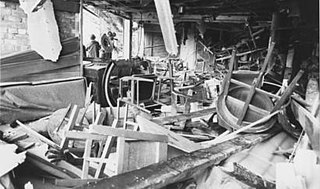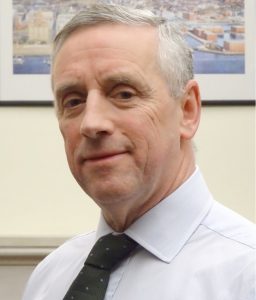Related Research Articles

The Birmingham Six were six Irishmen who were each sentenced to life imprisonment in 1975 following their false convictions for the 1974 Birmingham pub bombings. Their convictions were declared unsafe and unsatisfactory and quashed by the Court of Appeal on 14 March 1991. The six men were later awarded financial compensation ranging from £840,000 to £1.2 million.

The Birmingham pub bombings were carried out on 21 November 1974, when bombs exploded in two public houses in Birmingham, England, killing 21 people and injuring 182 others.
The Guildford Four and Maguire Seven were the collective names of two groups of people, mostly Irish, who were wrongly convicted in English courts in 1975 and 1976 for the Guildford pub bombings of 5 October 1974, and the Woolwich pub bombing of 7 November 1974. All the convictions were eventually quashed after long campaigns for justice, and the cases, along with those of the Birmingham Six, shattered public confidence in the integrity of the English criminal justice system.
The Bridgewater Four are four men who were tried and found guilty of killing 13-year-old paperboy Carl Bridgewater, who was shot in the head at close range near Stourbridge, England, in 1978. In February 1997, after almost two decades of imprisonment, their convictions were overturned and the three surviving defendants were released; the fourth defendant had died in prison two years into his sentence. Bridgewater's murder remains unsolved.
The West Midlands Serious Crime Squad was a police unit in the English West Midlands which operated from 1974 to 1989. It was disbanded after an investigation into allegations of incompetence and abuse of power on the part of some of the squad's members. Some of this misconduct resulted in wrongful convictions, including the high-profile case of the Birmingham Six. The sister Regional Crime Squad based at Bilston was responsible for the investigation of the Bridgewater Four.

West Midlands Police is the territorial police force responsible for policing the metropolitan county of West Midlands in England.

The Police and Criminal Evidence Act 1984 (PACE) is an Act of Parliament which instituted a legislative framework for the powers of police officers in England and Wales to combat crime, and provided codes of practice for the exercise of those powers. Part VI of PACE required the Home Secretary to issue Codes of Practice governing police powers. The aim of PACE is to establish a balance between the powers of the police in England and Wales and the rights and freedoms of the public. Equivalent provision is made for Northern Ireland by the Police and Criminal Evidence Order 1989 (SI 1989/1341). The equivalent in Scots Law is the Criminal Procedure (Scotland) Act 1995.
In the English law of homicide, manslaughter is a less serious offence than murder, the differential being between levels of fault based on the mens rea or by reason of a partial defence. In England and Wales, a common practice is to prefer a charge of murder, with the judge or defence able to introduce manslaughter as an option. The jury then decides whether the defendant is guilty or not guilty of either murder or manslaughter. On conviction for manslaughter, sentencing is at the judge's discretion, whereas a sentence of life imprisonment is mandatory on conviction for murder. Manslaughter may be either voluntary or involuntary, depending on whether the accused has the required mens rea for murder.

Dame Barbara Jean Lyon Mills DBE, QC was a British barrister. She held various senior public appointments including Director of Public Prosecutions, and was widely seen as a pioneer for women gaining such appointments in the higher echelons of the legal profession. At the time of her death she was chair of the Professional Oversight Board.
David Greenhalgh Jessel is a former British TV and radio news presenter, author, and campaigner against miscarriages of justice. From 2000 to 2010, he was also a commissioner of the Criminal Cases Review Commission.

English criminal law concerns offences, their prevention and the consequences, in England and Wales. Criminal conduct is considered to be a wrong against the whole of a community, rather than just the private individuals affected. The state, in addition to certain international organisations, has responsibility for crime prevention, for bringing the culprits to justice, and for dealing with convicted offenders. The police, the criminal courts and prisons are all publicly funded services, though the main focus of criminal law concerns the role of the courts, how they apply criminal statutes and common law, and why some forms of behaviour are considered criminal. The fundamentals of a crime are a guilty act and a guilty mental state. The traditional view is that moral culpability requires that a defendant should have recognised or intended that they were acting wrongly, although in modern regulation a large number of offences relating to road traffic, environmental damage, financial services and corporations, create strict liability that can be proven simply by the guilty act.
Rough Justice is a British television programme that was broadcast on BBC, and which investigated alleged miscarriages of justice. It was broadcast between 1982 and 2007 and played a role in overturning the convictions of 18 people involved in 13 separate cases where miscarriages of justice had occurred. The programme was similar in aim and approach to The Court of Last Resort, the NBC programme that aired in the United States from 1957–58. It is credited with contributing to the establishment of the Criminal Cases Review Commission in 1997.

R v Wang (2005) in the criminal law of England and Wales is the binding precedent, from the highest court, that a judge in England or in Wales is not entitled to direct, or instruct, order or require, a jury to return a verdict of guilty.
Sir Brian Henry Leveson is a retired English judge who served as the President of the Queen's Bench Division and Head of Criminal Justice.

Regina v Armel Gnango[2011] UKSC 59 is the leading English criminal law case on the interaction of joint enterprise, transferred malice, and exemption from criminal liability where a party to what would normally be a crime is the victim of it. The Supreme Court held, restoring Gnango's conviction for the murder of Magda Pniewska, that he was guilty of murder notwithstanding the fact that he had not fired the shot which killed Pniewska during the shoot out which led to her death, and that the fatal shot had been fired by his opponent in an attempt to kill him. The judgment of the Supreme Court has been criticised over the alleged extent to which it was designed to mollify public opinion, and in the context of debates over the nature of the doctrine of joint enterprise.

Sir Timothy Victor Holroyde, PC, styled The Rt. Hon. Lord Justice Holroyde, is an English Court of Appeal judge, formerly a judge of the High Court of Justice of England and Wales, Queen's Bench Division. He was appointed to the Court of Appeal in October 2017. He was sworn of the Privy Council in 2017. In 2015 he was appointed a member of the Sentencing Council for England and Wales, and served as its Chairman between 2018 and 2022. In June 2022 he was appointed Vice-President of the Court of Appeal, succeeding Lord Justice Fulford.

Communicourt is a legal services company, based in Birmingham in the West Midlands, United Kingdom. It provides Non-Registered Intermediaries for defendants in criminal proceedings and respondents in family proceedings in the United Kingdom.

R v Jogee[2016] UKSC 8 was a 2016 judgment of the Supreme Court of the United Kingdom that reversed previous case law on joint enterprise. The Supreme Court delivered its ruling jointly with the Judicial Committee of the Privy Council, which was considering an appeal from Jamaica, Ruddock v The Queen [2016] UKPC 7.

Colonel Oliver Andrew Lee, is a former senior Royal Marines officer and subsequently chief executive.
References
- ↑ Hansard 1991
- ↑ See MOJUK 2018 for the original list
- 1 2 Staff reporter 1999
- 1 2 3 4 5 6 7 8 9 10 11 12 13 14 15 16 17 18 19 20 21 22 23 24 Hansard 1994
- 1 2 3 Burrell 1999
- 1 2 3 4 5 6 7 8 9 Birmingham Live 2011b
- ↑ Bourke 2005
- ↑ Unknown 1999
- ↑ BBC News 2003, Coventry Live 2003
- ↑ "CUMMISKEY, John Joseph". Criminal Cases Review Commission.
- ↑ Allen 1994 , p. 368
- ↑ McCarthy 2013
- ↑ Pitchford, Dingemans & William Davis 2014
- ↑ Auld, Aikens & Grigson 2003
- ↑ "FRASER, Lloyd George". Criminal Cases Review Commission.
- ↑ Kirby 1994
- 1 2 Mitchell & Keith 2002
- ↑ Inside Justice 2018
- ↑ Safari 2012
- ↑ Kay, Gibbs & Evans 2003b
- 1 2 BBC News 2006
- ↑ Kay, Gibbs & Evans 2003a
- ↑ "MURRAY, Anne Marie". Criminal Cases Review Commission.
- ↑ Rose, Jowitt & Hooper 1999
- ↑ Rose 1996
- ↑ Mullin 1991, Statewatch 1992
- ↑ Birmingham Post & Mail 2010